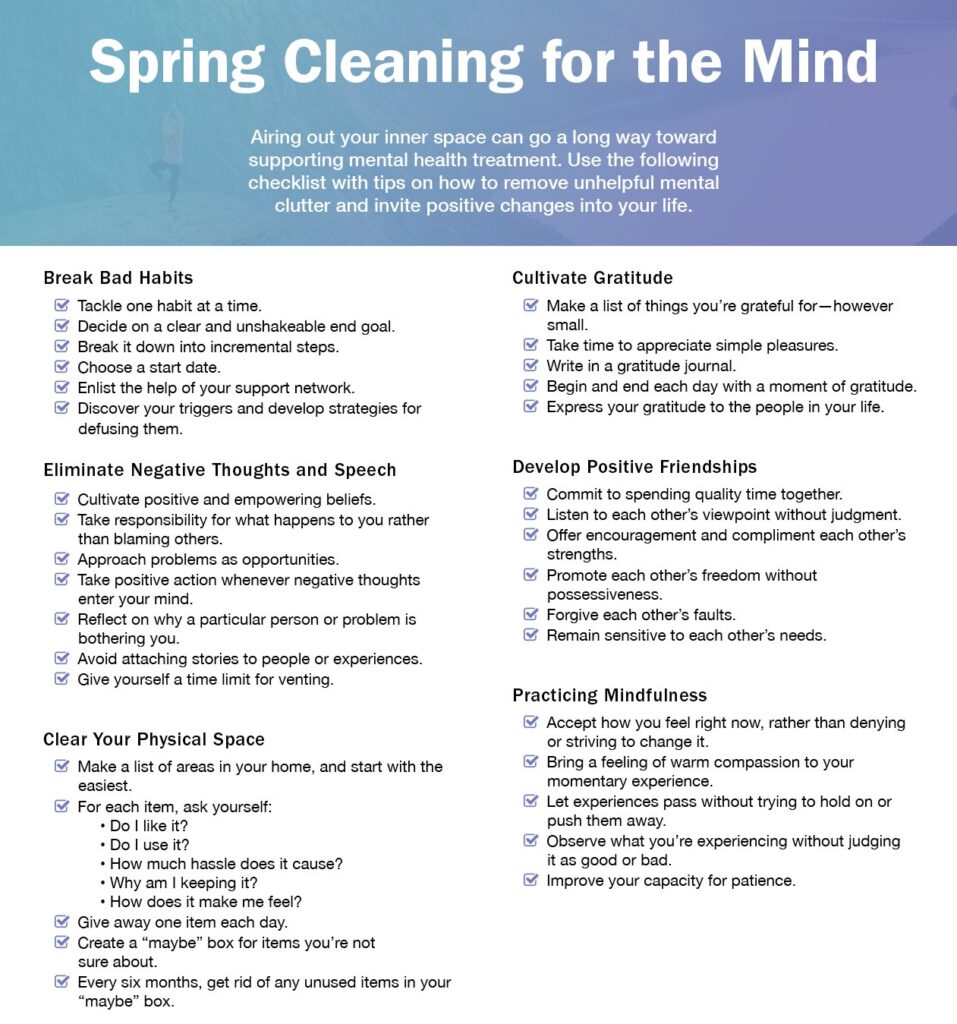Spring-cleaning your emotional and mental space is important to your well-being. When spring rolls around, we are reminded there’s a sense of hope, renewal, and lightheartedness. The weather improves; daylight lasts longer; birds chirp their sweet sounds bright and early each morning, signaling the start of a new day; flowers, bushes, and grass blossom in the colder states as temperatures rise. Suddenly it’s a great idea to make plans for decluttering, whether in your professional or personal life.
Spring ushers in a sense of reawakening—a restlessness—that we can apply inside and out to our lives and to our recovery and self-care. Maybe there are some at-home and/or repair tasks you’ve been avoiding during the dull stretch of winter. Or, you have personal goals you’ve let stew on the back-burner and now are motivated to tackle.
You feel it’s time and are inspired to declutter junk physically, and emotionally, there is baggage you’d like to clean up and let go of so that you can breathe freshness and ‘space’ into your soul and spirit. But how to start? Taking an inventory in your lifestyle, emotions and physical health can be that first stepping stone to engaging you in thinking about these different areas in your life.
Psychology Today points out, “Emotional clutter can accrue just like bric-a-brac, clothes, shoes, furniture, and cooking utensils—all that stuff that clutters your physical space. Similarly, emotional clutter most often comes from stress that clogs our psyche.”
Although stress is often attributed to life changing events, like losing a spouse, partner or relative, the loss or change in jobs, mourning a lost pet, stress from a lower level, such as everyday events add up and can soon become ‘the “‘little foxes’ that can destroy the vineyard.”

These daily, perhaps hourly events, fuel and reside in your emotional ‘tank,’ which eventually starts to deplete, one pillar at a time, as more events topple on top. Psychology Today says the ‘little’ stressors can range from:
- Daydreaming and running a red light as the traffic camera catches you, and now you have a fine of hundreds of dollars you have to pay for the ticket because of a few seconds of ‘spacing out.’
- Your boss assigns you a new project or more work to your already overloaded plate.
- You were so busy tending to life you forgot to mail in your credit card payment and now you have to pay interest charges.
- Your refrigerator breaks down and the service person can’t come for two weeks.
Or maybe, it’s bigger stressors:
Financial pressure resulting from when you were using and not on top of your finances that led to some reckless spur-of-the-moment spending and now you have a financial debt to deal with in your life.
Or, you overschedule yourself due to now you have more free-time on your hands since you’re in recovery and not using.
Stress creates a mess by clogging up your psyche with anxiety, worry, depression, irritability, and anger—to name a few of stress mess emotions. The emotional closet is stuffed to the gills with negative thinking, pessimism, and cynicism caused by these stress aftereffects ~ Psychology Today
The Cure: Amp up your Wellness Toolbox:
There are different ways you can spring-clean with the goal-in-mind of creating a happy, healthy emotional and mental space.
Spring Clean Relationships:
“When you are talking about spring cleaning your relationships, it is about taking a step back and looking at (each one) from a bird’s eye view,” says Jennine Estes, LMFT, a certified emotionally focused psychotherapist who works primarily with couples in San Diego.
She advises to reflect on the non-negotiables you’d like to keep and what are the changes you’d like to make. “List the habits and communication styles that you like and dislike, and decide which ones to keep and toss. For instance, maybe you realize that you don’t like watching TV with your partner every night, and would rather connect face-to-face. Maybe you realize you’d like to work on being assertive—instead of passive-aggressive—with your friends when they hurt your feelings.”
Also, Estes says it’s good to question yourself and ask, “Do you feel good about how much time you’re spending with your partner, your family and friends, your kids—and yourself? While you won’t be able to reach a perfect balance, you can reflect on a good-enough split, and make small changes. Maybe you’d like a weekly lunch date with your best friend, and a few nights out with your husband. Maybe you need a few hours to yourself every week.”

Spring-cleaning Yourself:
Prioritizing: What is at the top of your list of priorities? You can start by looking at what is most important for your recovery. Self-care? Family-time? Friends-time? Hobbies? R&R? You can journal this question with your answers or write it down on paper and this process will put things into perspective as well as once you better understand what your goal—course of action—is, the anxiety and/or fear will subside quite a bit, if not all.
Forgiveness: Letting go of an event or person that hurt you and/or festered anger. By forgiving, it releases the tense energy in your body (allowing for new energy to come in) and helps you move forward and get past the ‘ropes’ or ‘chains’ that were holding you back.
Physical health: If you haven’t felt motivated to exercise, spring-into-summer is a great time to set goals for yourself. A great tool for this is www.myfitnesspal.com, which offers up a realistic plan-of-action and is super user-friendly as well as accessible at your fingertips.
Expand your creative self: Explore a new hobby that involves creativity. This could be taking dance lessons, art, photography, yoga, pottery, painting, or wood carving. If you’re unsure ‘what hobby’ it is you’d be drawn to, go visit your local arts and hobby store like Hobby Lobby, Target, Walmart or search Amazon for some cool starter kits online. The key is to be true to yourself and pick something that either moves you or something that intrigues you and go give it a test-run!
Here’s a handy checklist for inspiration!

If you feel you need more help, please contact us for more information or for assitance to find the right type of support for your self-care and recovery goals.


